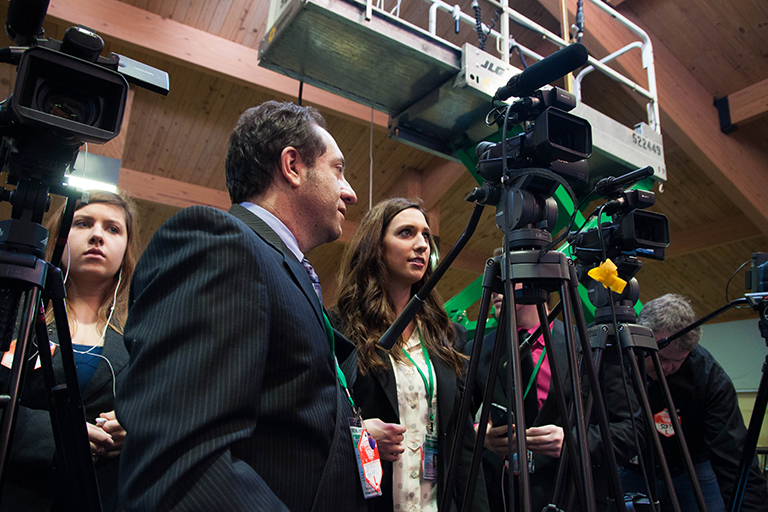ComArtSci students have a diverse range of interests, from creating ad campaigns to crafting compelling stories. The college is now offering three new minors for students to expand their knowledge and experiences beyond their major coursework: Sports Journalism, Broadcast Journalism and Advertising Analytics.
Sports Reporting Minor Gives Students Courtside Experience
Although Sports Journalism is currently offered as a focus area, it will also be available as a minor starting this fall. Students will have the ability to begin taking courses for their minor during their freshman year. Through the minor, they will develop skills in sports reporting, as well as broadcasting, writing and editing for multimedia. They will also pick up skills in sports media relations and learn how to navigate tight deadlines when working with uncertain game outcomes.
Sports Journalist in Residence Joanne Gerstner said the need for this minor evolved out of its growing student and industry demand.
“The goal is to provide a rigorous academic education, based in the real world,” said Gerstner. “We want our students to be well-rounded in sports multimedia, and also grounded in ethics and new ways of approaching sports coverage."
The Sports Journalism Study Abroad to Paris and Rome, as well as special topics courses, will be a part of the minor. In addition, a new multimedia sports content management and leadership course focusing on coverage decisions, will debut this fall. Students interested in the minor can also join the award-winning Spartan Sports Report, Big Ten Network University and ESPN’s student network for additional experience.
“We know our approach works well, as our Sports Journalism students are landing great internships and jobs because of their talent and skill set,” said Gerstner. “We are honing them to make them competitive – and hopefully stars! – in the sports media field.”
Broadcast Journalism Minor Provides On-Air Practice for Students
Students with a passion in broadcast journalism can now expand their focus area into the new Broadcast Journalism minor coming to ComArtSci this fall. Students can start earning credits toward the minor as a freshman through an introductory class focusing on editing video and telling stories visually with their mobile phone. There will also be a course on hosting, interviewing and announcing for students who may want to host their own show someday. Courses on radio news, beginning TV news and advanced TV news will be a core component of the minor. As part of the advanced TV news course, students will learn about reporting, shooting and editing video and writing for broadcast through the award-winning, student-produced newscast Focal Point.
Outside of the classroom, students will have additional opportunities to attend conferences, workshops, network and submit their work for various awards. Broadcast Journalist in Residence Bob Gould sees the minor as an opportunity to make the program a destination for broadcast students in Michigan and across the country.
“We hope that students will flock to the minor, that they see it as an opportunity, that they know they’ll get a deep understanding of broadcast and have a good chance of finding a job in the industry,” said Gould. “I think it will help them ultimately understand the path they need to take to get through their college career.”
Advertising Analytics Minor Helps Students Navigate the Growing Field
This spring marks the first year anniversary of the newly-established Advertising Analytics minor. Students will learn how to collect, clean and analyze different kinds of data, as well as discover what kind of data are available outside of social media and web analytics. Kjerstin Thorson, assistant professor of Advertising and Public Relations and director of the minor, also wants students to understand that it’s possible to be creative with data, especially when it comes to designing analyses and translating traditional data science functions into creative and strategic campaigns.
“We found that our students working in this area are better prepared than students in other programs to jump in running in these kinds of jobs,” said Thorson. “And the cool thing about these jobs is that often, you’ll be the first person in that job, so what I keep saying to our Digital Analytics class is that, ‘You are inventing this as a field and a set of practices. It’s constantly changing — there’s no one right way to do anything — so you have to be able to learn on your own and be curious and follow what’s happening with the latest changes in the area.”
Students in the minor are also given the first opportunity to network with professionals who are brought in for events like Data Day. More special experiences are expected to be added in the coming years.
By Rianna N. Middleton
